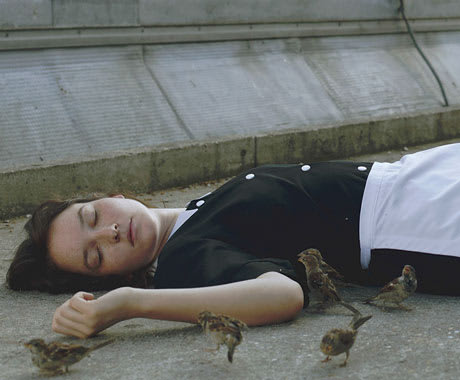Initially, Bird People, Pascale Ferran's long-awaited follow-up to her grounded and assured adaptation of Lady Chatterley in 2006, presents itself as an intriguing, seemingly metaphysical rumination on the nature of consciousness and social function. We're thrust into a variety of different perspectives on a commuter train, each disjointed or disconnected by earphones, an ongoing inner dialogue or a deliberate effort to ignore the noises around them.
Though this idea and cinematic construct isn't novel unto itself, Ferran's focus on the intimate within this context suggests alienation and isolation as thematic trajectories. It also infers an overwhelming limitation on the human experience, exaggerating (or exposing) just how little we can actually comprehend from our passive, fleeting engagement with the complex stimuli surrounding us.
These notions continue once we're introduced to the main characters: Gary (Josh Charles), an American in France on business, and Audrey (Anaïs Demoustier), a maid at the airport Hilton.
Our window into the thoughts of these people is limited to superficial observation at first. Gary seems preoccupied with his devices and has a detached disposition. Though he's alerted to the sights and experiences available in Paris, he expresses indifference and even minor annoyance; the assumption is that he's focused on work or is nervous about his meeting but Ferran refuses to let us in before putting in our time.
Similarly, Audrey stares curiously out of windows as she endures her lengthy daily commute and seems resentful about her job, but how she got to this stage in her life and what sort of dreams or ambitions she might have beyond her current state isn't immediately articulated.
From here, the narrative fragments into two lengthy defining situational moments. Both characters, seemingly fed up with the materiality and passionless functionality of the quotidian, create a dramatic break in their current existence, removing the weight of responsibility to see things in a new light. With Gary, the act is an indulgent and selfish one — a quite literal break from the life he's built — whereas Audrey's experience is far more fantastical and gracelessly metaphorical.
Ferran's ideas of freedom and shifting perspectives in a material world that refuses to slow down for those determined to get some footing are valid and, in theory, should offer something to contemplate. Unfortunately, the obviousness of the metaphors and the repetitive imagery — birds and planes both soar high above it all — doesn't leave a lot of room for interpretation. And once all is said and done, the resolution and overall message is so twee and irresponsible that it's tempting to interpret it as cynical irony.
In short, the biggest issue with Bird People is the fact that it continually builds itself up to something that never actually happens. And what does happen is, sadly, sort of laughable.
(FunFilm)Though this idea and cinematic construct isn't novel unto itself, Ferran's focus on the intimate within this context suggests alienation and isolation as thematic trajectories. It also infers an overwhelming limitation on the human experience, exaggerating (or exposing) just how little we can actually comprehend from our passive, fleeting engagement with the complex stimuli surrounding us.
These notions continue once we're introduced to the main characters: Gary (Josh Charles), an American in France on business, and Audrey (Anaïs Demoustier), a maid at the airport Hilton.
Our window into the thoughts of these people is limited to superficial observation at first. Gary seems preoccupied with his devices and has a detached disposition. Though he's alerted to the sights and experiences available in Paris, he expresses indifference and even minor annoyance; the assumption is that he's focused on work or is nervous about his meeting but Ferran refuses to let us in before putting in our time.
Similarly, Audrey stares curiously out of windows as she endures her lengthy daily commute and seems resentful about her job, but how she got to this stage in her life and what sort of dreams or ambitions she might have beyond her current state isn't immediately articulated.
From here, the narrative fragments into two lengthy defining situational moments. Both characters, seemingly fed up with the materiality and passionless functionality of the quotidian, create a dramatic break in their current existence, removing the weight of responsibility to see things in a new light. With Gary, the act is an indulgent and selfish one — a quite literal break from the life he's built — whereas Audrey's experience is far more fantastical and gracelessly metaphorical.
Ferran's ideas of freedom and shifting perspectives in a material world that refuses to slow down for those determined to get some footing are valid and, in theory, should offer something to contemplate. Unfortunately, the obviousness of the metaphors and the repetitive imagery — birds and planes both soar high above it all — doesn't leave a lot of room for interpretation. And once all is said and done, the resolution and overall message is so twee and irresponsible that it's tempting to interpret it as cynical irony.
In short, the biggest issue with Bird People is the fact that it continually builds itself up to something that never actually happens. And what does happen is, sadly, sort of laughable.
